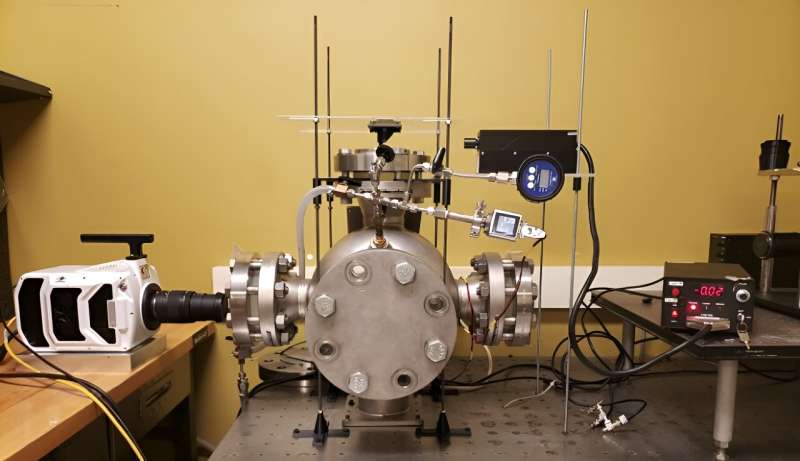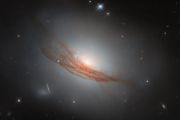
Copernical Team
NASA Observes Mars Illuminated During Major Solar Storm
 In addition to producing auroras, a recent extreme storm provided more detail on how much radiation future astronauts could encounter on the Red Planet.
Mars scientists have been anticipating significant solar storms since the Sun entered a period of peak activity earlier this year called solar maximum. Over the past month, NASA's Mars rovers and orbiters have provided researchers with dir
In addition to producing auroras, a recent extreme storm provided more detail on how much radiation future astronauts could encounter on the Red Planet.
Mars scientists have been anticipating significant solar storms since the Sun entered a period of peak activity earlier this year called solar maximum. Over the past month, NASA's Mars rovers and orbiters have provided researchers with dir NASA and Boeing Advance Starliner Tests with Crew at Space Station
 NASA astronauts Butch Wilmore and Suni Williams are testing Boeing's Starliner spacecraft at the International Space Station. This mission aims to collect data for NASA certification of the Starliner for regular crewed missions to the station.
As part of the Boeing Crew Flight Test, Wilmore and Williams, with ground teams, are completing various objectives since Starliner arrived at the st
NASA astronauts Butch Wilmore and Suni Williams are testing Boeing's Starliner spacecraft at the International Space Station. This mission aims to collect data for NASA certification of the Starliner for regular crewed missions to the station.
As part of the Boeing Crew Flight Test, Wilmore and Williams, with ground teams, are completing various objectives since Starliner arrived at the st Using the moon's soil to support life, energy generation and construction

Imagine the moon as a hub of manufacturing, construction and even human life. It's no longer a far-fetched idea baked in science fiction lore—increased interest and investment in space exploration are pushing efforts to develop the technologies needed to make the moon a viable home for humans.
Developing lunar infrastructure requires building materials, and shuttling these over from Earth would be costly and inefficient. This has fueled research into the in-situ processing and use of raw materials naturally found on the moon's surface. However, one major challenge with this approach will be the immense amount of power the lunar resource processing will need.
A research team from the University of Waterloo's Laboratory for Emerging Energy Research (LEER) is looking into processing lunar regolith, the moon's top layer of soil and dust, into usable materials for life support, energy generation and construction. This includes investigating the use of defunct satellite material as a fuel source when mixed with lunar regolith.
NOAA's hurricane hunting GOES-U satellite nears SpaceX Falcon Heavy launch

Hurricanes Michael, Dorian, Ian, Nicole and Idalia have all been stared down by one of the NOAA's most powerful satellites since it took its place in geostationary orbit in late 2017. Its replacement is gearing up for launch on a SpaceX Falcon Heavy later this month.
The GOES-U satellite is the 19th Geostationary Operational Environmental Satellite in the NOAA and NASA partnership since the first one launched in 1975. It's the fourth and final of the latest version of the satellites. The first three are already parked at more than 22,000 miles altitude and have their wide-view sites set to track tropical weather, fires, lightning and other dangerous weather on Earth.
The final satellite sits in a stark, white clean room at Astrotech Space Operations' payload processing facility just across the river from Kennedy Space Center. It's already fueled and awaits encapsulation in a SpaceX fairing before heading to KSC for launch. Liftoff is slated for June 25 at 5:16 p.m. during a two-hour window atop what will be the first Falcon Heavy launch of the year.
All four satellites are part of what NOAA calls the GOES-R series, the most powerful satellites for weather forecasting.
A milestone in digital Earth modelling

Destination Earth is now live! Launched today during a ceremony at the EuroHPC LUMI Supercomputer Centre in Kajaani, Finland, Destination Earth provides unprecedented insights into the complexity of our planet to advance climate change adaption and environmental resilience modelling.
Frosty volcanoes discovered in Mars’s tropics

ESA’s ExoMars and Mars Express missions have spotted water frost for the first time near Mars’s equator, a part of the planet where it was thought impossible for frost to exist.
Earth's Climate May Have Been Affected by Interstellar Clouds 2 Million Years Ago
 Around two million years ago, Earth experienced multiple ice ages, coinciding with significant climatic changes. Scientists propose that these ice ages were caused by factors such as the planet's tilt, rotation, plate tectonics, volcanic eruptions, and atmospheric carbon dioxide levels. A new study suggests that the sun's position in the galaxy could also have influenced Earth's climate.
I
Around two million years ago, Earth experienced multiple ice ages, coinciding with significant climatic changes. Scientists propose that these ice ages were caused by factors such as the planet's tilt, rotation, plate tectonics, volcanic eruptions, and atmospheric carbon dioxide levels. A new study suggests that the sun's position in the galaxy could also have influenced Earth's climate.
I Yahsat Contracts Airbus for New Al Yah Satellites
 Al Yah Satellite Communications Company PJSC (Yahsat) has contracted Airbus Defence and Space for its new geostationary telecommunications satellites, Al Yah 4 ("AY4") and Al Yah 5 ("AY5").
This step follows the signing of an Authorisation-to-Proceed with Airbus in Q2 2023 to begin initial activities related to the AY4 and AY5 satellite program.
Airbus will design and build the AY4 a
Al Yah Satellite Communications Company PJSC (Yahsat) has contracted Airbus Defence and Space for its new geostationary telecommunications satellites, Al Yah 4 ("AY4") and Al Yah 5 ("AY5").
This step follows the signing of an Authorisation-to-Proceed with Airbus in Q2 2023 to begin initial activities related to the AY4 and AY5 satellite program.
Airbus will design and build the AY4 a European Consortium Receives euro 15M for Inflatable Heat Shield Development
 A European consortium, led by Spanish mission and system integrator Elecnor Deimos ("Deimos"), is working to develop an inflatable heat shield (IHS) for recovering rocket stages from space. This system could also protect cargo during re-entry and may be used for Mars missions.
ICARUS ("Inflatable Concept Aeroshell for the Recovery of a re-Usable launcher Stage") has received euro 10 milli
A European consortium, led by Spanish mission and system integrator Elecnor Deimos ("Deimos"), is working to develop an inflatable heat shield (IHS) for recovering rocket stages from space. This system could also protect cargo during re-entry and may be used for Mars missions.
ICARUS ("Inflatable Concept Aeroshell for the Recovery of a re-Usable launcher Stage") has received euro 10 milli 
































